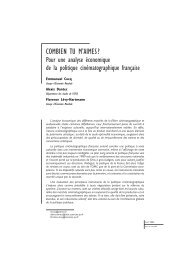N° 2005-09 Juin 2005 Guillaume Daudin* Jean-Luc Gaffard ...
N° 2005-09 Juin 2005 Guillaume Daudin* Jean-Luc Gaffard ...
N° 2005-09 Juin 2005 Guillaume Daudin* Jean-Luc Gaffard ...
You also want an ePaper? Increase the reach of your titles
YUMPU automatically turns print PDFs into web optimized ePapers that Google loves.
Offshore Outsourcing in the EU Financial Services Industrytime of Adam Smith and David Ricardo. In the past, the service sector was largely consideredimpervious to international competition. With improvements in communication technologies,such as the Internet, services can now cross national borders. Although service offshoring stillremains a small fraction of individual countries’ GDP (Amiti M. and S.J. Wei, 2004a), it iswithout a doubt the newest chapter in the globalisation debate.But offshoring, let alone its consequences, does not appear to be widely understood.Some people interpret it to mean outside the firm, and others outside the country. Media andpolitical attention seems firmly focused on offshore outsourcing, even though domesticoutsourcing is also common. So, the nations still have much to learn about offshoring, andexisting data is not adequate to the task. There are currently no reliable statistical indicators ofthe extent or the nature of offshoring. Besides management consultant reports 2 , there is indeedvery little empirical economic research on service offshoring. Most of the studies carried outso far have been in the United States. Therefore, we thought it would be useful to examinethis phenomenon to distinguish facts from exaggerated claims.Drawing on the experiences of the United States, we can say that, in the aggregate, joblosses in one industry often are offset by jobs created in other growing industries (Amiti M.and S.J. Wei, 2004b; Brainard L. and R. Litan, 2004; Schultz C., 2004). Moreover, Americaneconomists argued that international relocation contributes to lower inflation and higherproductivity, meaning that the overall economy will grow faster (Mann C., 2004; Council ofeconomic advisors, 2004). Catherine Mann (Institute for International Economics) hasestimated that US GDP growth would have been lower by 0.3 percent a year between 1995and 2002 3 without international relocation of jobs in information technology (Mann C.,2003).on the offshoring strategies of leading European companies (polled a representative sample covering more than20 percent of total revenues of Europe’s top 500 companies).2 Looking forward, perhaps the best-know projection is by Forrester Research (2004), an information technologyconsulting firm, which expects the number of US jobs outsourced to grow from about 400.000 in 2004 to 3.3million by 2015. If this estimate turns out to be accurate, then offshoring could result in roughly 250.000 layoffsa year. Goldman Sachs has estimated that offshoring has accounted for roughly half a million layoffs in the pastthree years. According to the McKinsey Global Institute (2003), for every dollar of US services activityoffshored, a net gain of 12 to 14 cents is generated. Another Forrester Research report states that offshore servicespending in Western Europe will grow from 1.1 billion in 2004 to 3.6 billion euros in 20<strong>09</strong>, with the UnitedKingdom accounting for 76 percent at that point. The IT consultancy firm, Gartner (2003), estimates an ultimategrowth of 40% in offshore outsourcing in Europe. Gartner also predicts that almost a third of leading Europeanbusinesses will include an offshore element in their IT plans by <strong>2005</strong>. As a result of this shift of IT servicesoverseas, up to 25 percent of EU and US IT jobs could go to the emerging markets by 2010. But Gartner predictsthat the new European countries will become popular for “nearshore” outsourcing of some operations.3 Indeed, lower inflation and higher productivity have allowed the Federal Reserve to run a moreaccommodative monetary policy.28








